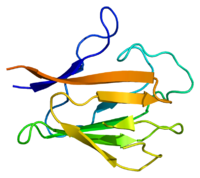
Photo from wikipedia
A variety of human neurologic diseases are caused by inherited defects in DNA repair. In many cases, these syndromes almost exclusively impact the nervous system, underscoring the critical requirement for… Click to show full abstract
A variety of human neurologic diseases are caused by inherited defects in DNA repair. In many cases, these syndromes almost exclusively impact the nervous system, underscoring the critical requirement for genome stability in this tissue. A striking example of this is defective enzymatic activity of polynucleotide kinase-phosphatase (PNKP), leading to microcephaly or neurodegeneration. Notably, the broad neural impact of mutations in PNKP can result in markedly different disease entities, even when the inherited mutation is the same. For example microcephaly with seizures (MCSZ) results from various hypomorphic PNKP mutations, as does ataxia with oculomotor apraxia 4 (AOA4). Thus, other contributing factors influence the neural phenotype when PNKP is disabled. Here we consider the role for PNKP in maintaining brain function and how perturbation in its activity can account for the varied pathology of neurodegeneration or microcephaly present in MCSZ and AOA4 respectively.
Journal Title: Mechanisms of Ageing and Development
Year Published: 2017
Link to full text (if available)
Share on Social Media: Sign Up to like & get
recommendations!